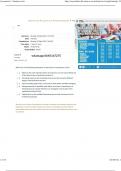Assessment 1: Attempt review https://mymodules.dtls.unisa.ac.za/mod/quiz/review.php?attempt=193
UNISA 2024 ECS1601-24-Y Online assessments Assessment 1
QUIZ
Started on Monday, 20 May 2024, 12:13 PM
State Finished
Completed on Monday, 20 May 2024, 1:45 PM
Time taken 1 hour 31 mins
Marks
out of 100.00
Question 1
Complete
Mark 1.00 out of 1.00
Which one of the following statements on the factors of production is true?
a. Money is the most important factor of production, as one cannot afford any
of the other factors of production without it.
b. All natural resources are renewable and can thus be re-used at different
stages of the production process
c. Labour includes gold miners, civil servants, bank tellers and �eet managers.
d. Entrepreneurship is classi�ed under labour as a factor of production, as
entrepreneurs are usually referred to as “managers” and are part of the
organisation’s labour force.
e. Capital refers to the available �nancial resources that a business has for
investment purposes.
Money is not a factor of production, but rather a medium of exchange, therefore, this
statement is incorrect. Not all natural resources are renewable, non-renewable or
exhaustible assets also exist which cannot be re-used in the production process, such
as minerals.
1 of 10 2024/05/20, 13
,Assessment 1: Attempt review https://mymodules.dtls.unisa.ac.za/mod/quiz/review.php?attempt=193
Question 2
Complete
Mark 1.00 out of 1.00
Which of the following statements is/are incorrect with regard to the main purpose of
economic theory?
a) Economic theory aims to capture every detail of a phenomenon under study.
b) Economic theory explains how the real economy functions.
c) Economic theory aims to predict changes in economic conditions and its impact
on the whole economy.
d) Economic theory serves as an underpinning for the formulation and analysis of
economic policies.
a. a and b
b. a and c
c. a only
d. a, b, c and d
The purpose of the economic theory is not to capture every detail of a phenomenon
under study.
Question 3
Complete
Mark 1.00 out of 1.00
Which of the following are three major �ows in the economy as a whole?
a. Spending, total income, and production.
b. Total spending, total income, and total production.
c. Saving, total investment, and spending.
d. Total income, spending, and saving.
The economy consists of three major �ows, namely total spending, total income, and
total production.
2 of 10 2024/05/20, 13
,Assessment 1: Attempt review https://mymodules.dtls.unisa.ac.za/mod/quiz/review.php?attempt=193
Question 4
Complete
Mark 1.00 out of 1.00
The two basic participants in the economy of South Africa are ………
a. households and �rms.
b. �rms and government.
c. �rms and the Reserve Bank.
d. households and government
The two basic participants in the economy of South Africa are households and �rms.
Question 5
Complete
Mark 1.00 out of 1.00
Which of the following statements is/are incorrect in explaining the tax being treated
as leakage in the circular �ow of income between household and �rms?
a) Tax is the part of income that is received by households but then paid to
government.
b) Tax is taken out of the circular �ow of income.
c) Households can spend it on goods and services.
d) Tax is an amount that is withdrawn or leaked from the circular �ow of income.
a. b only
b. a, b and c
c. b and c
d. c only
e. b, c and d
Tax is taken out of the circular �ow of income and households cannot spend it on
goods and services.
3 of 10 2024/05/20, 13
,Assessment 1: Attempt review https://mymodules.dtls.unisa.ac.za/mod/quiz/review.php?attempt=193
Question 6
Complete
Mark 1.00 out of 1.00
Which of the following are rewards of the factors of production?
a. Rent, labour, natural resources, interest
b. Entrepreneur, �rms, capital, labour
c. Pro�t, labour, land, household
d. Salaries and wages, interest, rent, pro�t
Reward for the factors of production are salaries and wages, interest, rent, and pro�t.
Question 7
Complete
Mark 1.00 out of 1.00
South Africa is an open economy. Therefore, the SA gross domestic product (GDP)
formula is?
a. GDP
b. C + I
c. GDP
d. C+G+I+(X-Z)
e. GDP
f. C+G+I-(X-Z)
g. GDP
h. C+I+G
South Africa is an open economy. Therefore, the SA gross domestic product (GDP)
formula is GDP = C+G+I+(X-Z).
4 of 10 2024/05/20, 13




